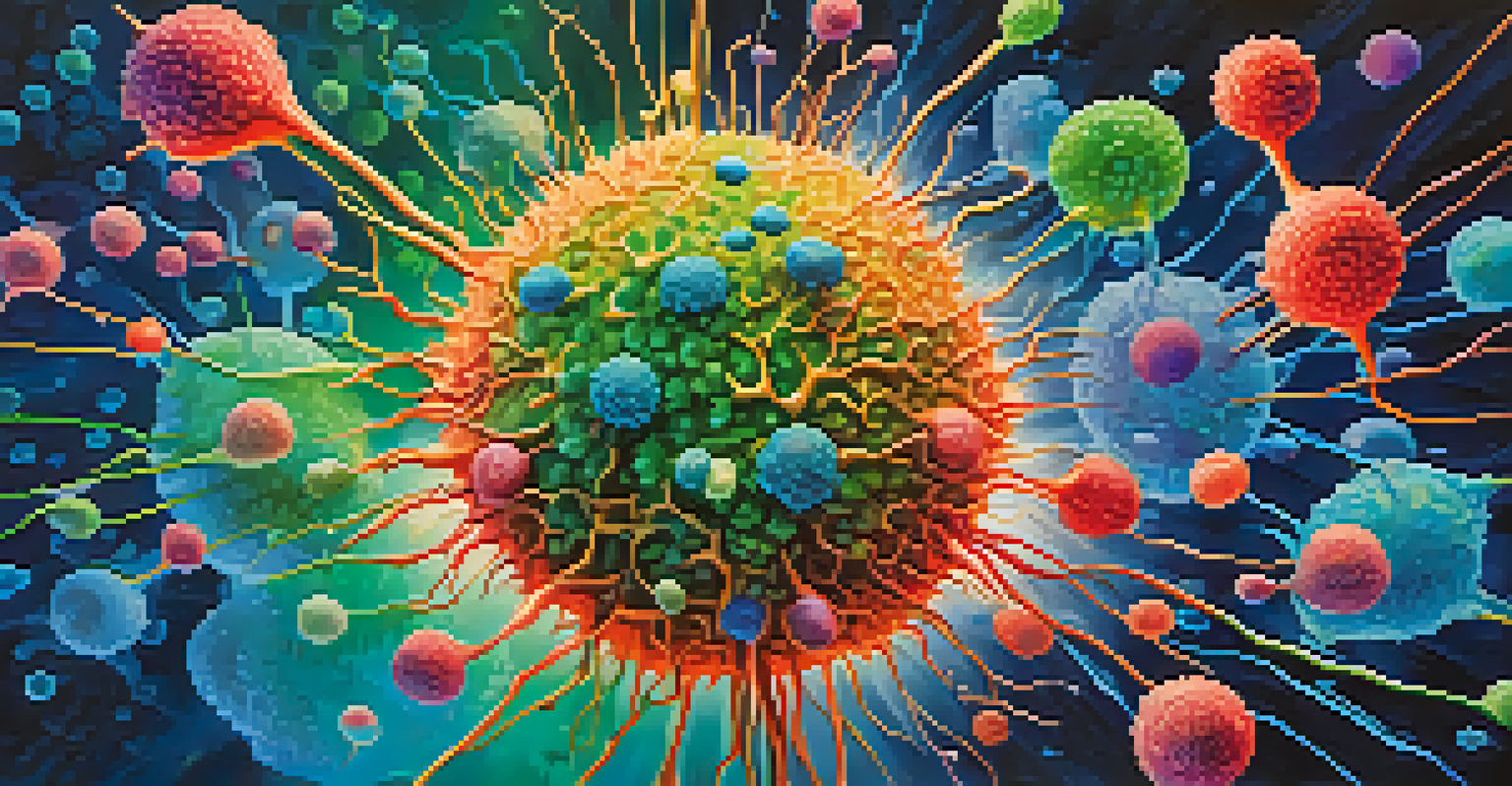Exploring the Latest Advances in Cancer Immunotherapy Research

What is Cancer Immunotherapy and How Does it Work?
Cancer immunotherapy is a revolutionary approach that harnesses the body's immune system to fight cancer. Unlike traditional treatments like chemotherapy, which directly target cancer cells, immunotherapy boosts the immune response, allowing it to identify and destroy the cancerous cells more effectively. This innovative method can lead to longer-lasting responses in some patients, offering hope where other treatments may have failed.
Immunotherapy is a game changer for cancer treatment, harnessing the body’s own immune system to fight cancer more effectively than ever before.
At its core, immunotherapy works by enhancing the natural ability of the immune system to recognize and attack cancer. This can be achieved through various techniques, such as monoclonal antibodies, checkpoint inhibitors, and cancer vaccines. Each of these approaches targets different pathways in the immune response, thereby increasing the effectiveness of the body’s natural defenses.
The beauty of immunotherapy lies in its ability to adapt and evolve. As researchers learn more about the specific mechanisms that allow cancer cells to evade the immune system, they continue to develop new strategies to enhance the effectiveness of these treatments. This ongoing research is crucial for improving outcomes and expanding the options available to patients.
Recent Breakthroughs in Checkpoint Inhibitor Therapy
Checkpoint inhibitors have emerged as one of the most exciting advancements in cancer immunotherapy. These drugs work by blocking proteins that prevent the immune system from attacking cancer cells, effectively unleashing the body’s natural defenses. Recently, several new checkpoint inhibitors have been approved for various types of cancer, showing promising results in clinical trials.

For instance, new combinations of checkpoint inhibitors are being tested to enhance their efficacy further. Research has indicated that combining these drugs with other treatment modalities, such as targeted therapies or chemotherapy, can lead to improved outcomes for patients. This approach allows for a multi-faceted attack on cancer, which is often necessary given the complexity of the disease.
Immunotherapy Enhances Cancer Treatment
Cancer immunotherapy boosts the immune system's ability to identify and destroy cancer cells, offering new hope for patients.
As we delve deeper into the world of checkpoint inhibitors, ongoing studies are focused on understanding which patient populations benefit the most from these treatments. Personalized medicine is at the forefront of this research, as scientists aim to identify biomarkers that can predict responses to immunotherapy, ensuring that patients receive the most effective treatment options.
The Role of CAR T-Cell Therapy in Cancer Treatment
Chimeric Antigen Receptor (CAR) T-cell therapy represents a groundbreaking approach in the realm of cancer treatment. This innovative therapy involves modifying a patient’s own T-cells to better recognize and attack cancer cells. By equipping these immune cells with a receptor specifically designed to target cancer, CAR T-cell therapy has shown remarkable success, especially in certain blood cancers.
The future of cancer therapy is not just in treating the disease, but in understanding how to personalize treatment for each individual patient.
Recent advancements in CAR T-cell therapy are focusing on expanding its applicability beyond hematologic malignancies to solid tumors. Researchers are exploring ways to enhance the persistence and efficacy of CAR T-cells in the challenging environment of solid tumors. This could potentially open new avenues for treatment, providing hope for patients with previously hard-to-treat cancers.
Moreover, the development of next-generation CAR T-cells is underway. These new iterations aim to overcome challenges such as tumor antigen heterogeneity and the immunosuppressive tumor microenvironment. By fine-tuning these engineered T-cells, scientists hope to create more effective therapies that can adapt to the dynamic nature of cancer.
Cancer Vaccines: A Promising Frontier in Immunotherapy
Cancer vaccines are an exciting and innovative area of research within immunotherapy. Unlike traditional vaccines that prevent disease, cancer vaccines are designed to treat existing cancer by stimulating the immune system to attack cancer cells. Recent advancements in this field have led to the development of personalized cancer vaccines tailored to an individual's specific tumor markers.
One of the key breakthroughs in cancer vaccines is the use of neoantigens—novel proteins found on cancer cells that are not present on normal cells. By identifying these unique markers, researchers can create vaccines that specifically target the cancerous cells while sparing healthy ones. This tailored approach has shown encouraging results in early clinical trials, leading to increased interest and investment in this area of research.
Checkpoint Inhibitors Show Promise
New checkpoint inhibitors are being combined with other therapies to improve efficacy and personalize cancer treatment.
Additionally, combining cancer vaccines with other immunotherapies, like checkpoint inhibitors, is proving to enhance the overall effectiveness of treatment. This synergy allows for a comprehensive attack on cancer, maximizing the chances of a durable response. As research continues, cancer vaccines hold great promise for transforming the landscape of cancer treatment.
The Impact of Combination Therapies in Immunotherapy
Combination therapies are gaining traction as a powerful strategy in cancer immunotherapy. By utilizing different treatment modalities together, healthcare providers aim to enhance the overall effectiveness of cancer treatments. This approach is particularly important given the complexity of cancer and the need for multifaceted treatment strategies to tackle various aspects of the disease.
Recent studies have shown that combining immunotherapy with other treatments, such as chemotherapy, radiation therapy, or targeted therapies, can lead to improved patient outcomes. For example, the addition of chemotherapy has been shown to enhance the immune response, making tumors more susceptible to immunotherapy. Such combinations not only improve efficacy but also help overcome resistance that may develop with single-agent treatments.
Moreover, researchers are continually exploring new combinations and treatment sequences to optimize patient care. By understanding how different therapies interact, they can better tailor treatment plans to individual patients. This personalized approach is essential for maximizing the benefits of immunotherapy and improving long-term survival rates.
Emerging Biomarkers for Personalized Immunotherapy
Biomarkers play a critical role in the future of personalized immunotherapy. These biological indicators can help predict how patients will respond to specific treatments, allowing for more tailored and effective care. As research progresses, identifying reliable biomarkers is becoming increasingly important in guiding treatment decisions and improving outcomes.
Recent advancements in genomic profiling and tumor sequencing have unveiled a wealth of information about the unique characteristics of individual tumors. This data can be harnessed to identify potential biomarkers that indicate which patients are likely to benefit from immunotherapy. For instance, the presence of certain mutations or immune cell types within a tumor can inform clinicians about the best treatment options.
Personalized Vaccines Target Tumors
Advancements in cancer vaccines focus on using neoantigens to create personalized treatments that specifically target cancer cells.
As the field of biomarker research evolves, the focus is shifting towards integrating these findings into clinical practice. This means developing standardized tests that can be easily implemented in healthcare settings, ensuring that patients receive the most appropriate and effective therapies based on their unique tumor profiles.
Challenges and Future Directions in Cancer Immunotherapy
Despite the promising advancements in cancer immunotherapy, several challenges remain. One of the most significant hurdles is the variability in patient responses to treatment. While some patients experience remarkable benefits, others may not respond at all, highlighting the need for further research to understand the underlying mechanisms of resistance and response.
Additionally, the potential for immune-related side effects poses another challenge in the field of immunotherapy. While these treatments can effectively target cancer, they can also inadvertently affect healthy tissues, leading to unwanted side effects. Researchers are actively working to develop strategies to minimize these risks while maximizing the benefits of immunotherapy.

Looking ahead, the future of cancer immunotherapy is bright. Continued research and innovation will likely lead to new treatment options and strategies that can enhance the effectiveness of current therapies. By fostering collaboration among researchers, clinicians, and patients, the goal of turning cancer into a manageable chronic condition is becoming increasingly attainable.
Conclusion: The Future of Cancer Treatment
In conclusion, the latest advances in cancer immunotherapy research represent a monumental shift in how we approach cancer treatment. With a deeper understanding of the immune system and its interactions with cancer, we're seeing the emergence of highly targeted therapies that offer new hope to patients. From checkpoint inhibitors to CAR T-cell therapy and personalized vaccines, the options are expanding.
As the field continues to evolve, ongoing research will play a crucial role in refining these therapies and identifying the best strategies for individual patients. The goal is not just to treat cancer but to improve the quality of life and survival rates for those affected by this disease. By embracing innovation and collaboration, we can drive forward the promise of immunotherapy.
Ultimately, the future of cancer treatment lies in harnessing the power of the immune system. As we explore the latest advancements and continue to make strides in research, we remain optimistic about the potential to transform cancer care and improve outcomes for patients around the world.